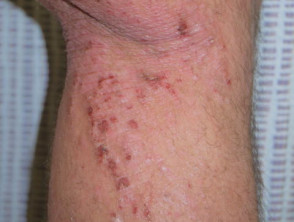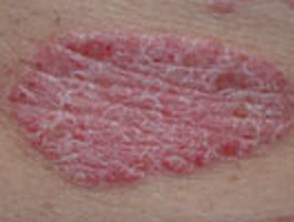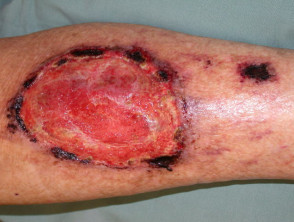What is ciclosporin?
Ciclosporin is an immunosuppressant medication that is used to treat some inflammatory illnesses. It is used for conditions that affect the skin and for conditions that affect other body organs. In New Zealand, ciclosporin is available and fully funded as a tablet and as an oral liquid. It is also available unfunded as eye drops and as an injection [1].
Ciclosporin works by selectively blocking calcineurin, a calcium-dependent serine-threonine protein phosphatase found in the T cells of the immune system. A calcineurin inhibitor reduces T-cell activation and the activity of the immune system [2].
Skin conditions that are sometimes treated with ciclosporin
Who uses ciclosporin?
In dermatology, ciclosporin can be used as a systemic agent for adults and children with severe skin conditions that are not adequately treated with topical therapies alone.
Common skin conditions that ciclosporin is used to treat are atopic eczema/dermatitis and psoriasis.
Less common skin conditions for which ciclosporin is sometimes used off-licence include:
- Pyoderma gangrenosum
- Dyshidrotic eczema
- Chronic urticaria
- Behçet disease
- Pityriasis rubra pilaris
- Dermatomyositis
- Pemphigus vulgaris
- Epidermolysis bullosa acquisita
- Lichen planus
- Hidradenitis suppurativa
- Prurigo nodularis
- Systemic sclerosis [3].
Other systemic uses of ciclosporin include to:
- Prevent organ rejection after solid-organ transplantation (eg, kidney transplant, lung transplant, liver transplant, or heart transplant)
- To prevent or treat graft-versus-host disease (a possible complication of bone marrow transplantation)
- To treat nephrotic syndrome
- To treat severe rheumatoid arthritis [1,2].
Topical ciclosporin eye drops can be used for keratoconjunctivitis and endogenous uveitis [4]. When used as an eye drop, there are usually undetectable levels of ciclosporin absorbed into the bloodstream [4].
There are other off-label uses of ciclosporin, and cases where ciclosporin has been effective, even though it is not usually used for those conditions. Such examples include the treatment of Stevens–Johnson / toxic epidermal necrolysis, and treatment of severe acute ulcerative colitis that has not responded to other treatments [1,5].
What are the contraindications with ciclosporin?
People who should not use ciclosporin include those who have:
- Current active cancer (except in some non-melanoma skin cancers)
- Uncontrolled hypertension
- Uncontrolled infection (eg, with chronic infections like hepatitis, tuberculosis, or human immunodeficiency virus [HIV]; or with acute infections like pneumonia or cellulitis)
- Had a previous allergic reaction to ciclosporin or ingredients in the ciclosporin preparations.
In most cases, people who develop these conditions while on ciclosporin should have the ciclosporin withheld or discontinued [1].
Tell me more about ciclosporin
Ciclosporin is a small lipophilic (fat-binding) protein, made up of a circular chain of 11 amino acids, which was originally derived from fungi. It is absorbed by the intestine after oral administration and is metabolised by cytochrome P-450 3A enzymes in the liver. Ciclosporin is then excreted in the bile [2,6].
All systemic forms of ciclosporin should initially be administered twice a day (every 12 hours), at the same time each day. Its metabolism differs between adults and children. In children, ciclosporin is likely to be absorbed more slowly and cleared more quickly, so children may need to take ciclosporin three times a day.
When given orally, ciclosporin takes approximately 1–8 hours to reach peak blood concentrations. Its elimination half-life is variable.
There are now two forms of ciclosporin: a modified version and the original, unmodified formulation [6].
- The unmodified formulation can be given orally or as an injection, but gut absorption is variable. The oral form requires bile to be absorbed.
- The modified version can only be given orally, but does not rely on bile for absorption and is better and more reliably absorbed from the gut. Its half-life is around 19 hours.
Ciclosporin does not have to be given with food but should be given at the same time about meals. The liquid formulation can be mixed with fruit juice (except grapefruit juice) to improve the taste but should be given straight after mixing. Ciclosporin solutions can adhere to plastic, so should be given in a non-plastic container [6].
The administered dose of ciclosporin is based on the patient's body weight and the condition being treated, usually at a dosage of 2–15 mg/kg per day in divided doses. Adjustments to the dose are made based on the improvement of symptoms and adverse effects. Blood tests for ciclosporin concentrations in the blood can also be helpful; these blood tests are done in one of two ways:
- 12 hours after the first dose, before the second dose (12-hour trough level)
- Two hours after the first dose (peak dose).
The dose can then be increased or decreased by 25–50 mg at the time of the next administration [2,6].
After disease remission is achieved, usually after 6–8 weeks of treatment, the dose of ciclosporin can be slowly reduced. Ciclosporin can eventually be given intermittently, such as twice weekly, as maintenance therapy. This is often continued for a longer period, such as up to 1 year [7,8].
What are the benefits of ciclosporin?
Ciclosporin is an effective medication that can be used for a wide range of conditions.
Ciclosporin is a safe medication when used under the guidance and monitoring of an experienced health professional.
What are the disadvantages of ciclosporin?
Ciclosporin can interact with some food, such as grapefruit, and other medications. It is important to check for interactions before starting any new medication. Some common medications that interact with ciclosporin include:
- Simvastatin and atorvastatin (suitable alternatives are fluvastatin, pravastatin and rosuvastatin)
- Non-steroidal anti-inflammatory drugs (NSAIDs), such as indomethacin and naproxen
- Antibiotics, such as sulfamethoxazole, trimethoprim, rifampicin, erythromycin, ciprofloxacin, tobramycin, and gentamicin
- Anticonvulsants, such as phenytoin and carbamazepine
- Antifungals, such as amphotericin B, ketoconazole, itraconazole, and fluconazole
- Anticoagulants, such as warfarin and dabigatran (interactions will increase the risk of bleeding)
- St John's wort (Hypericum perforatum) [3].
These medications should be avoided, or if not possible, ciclosporin levels should be monitored closely [1,2,6]. Given the risk of toxicity to the kidneys and other body organs, regular general blood tests, and monitoring by a doctor is required during treatment with ciclosporin.
Use in pregnant women
Ciclosporin is a category B medication. There are limited studies regarding the use of ciclosporin in pregnancy and breastfeeding, and the safety of this medication is not well-established. Although it has previously been used safely and has demonstrated non-teratogenicity (ie, it does not cause birth defects), it should be avoided unless the benefits outweigh potential harm [1,2,8,9]. There are specific concerns about the risk of inducing hypertension.
Use in older people
There are limited studies on the use of ciclosporin for skin conditions in older people. Caution is needed to avoid drug–drug interactions and the aggravation of any comorbidities, such as poor renal function [8,9].
There is a risk of recurrence or flare of diseases, such as a worsening of atopic eczema or psoriasis, after ciclosporin treatment is discontinued. This is mitigated by reducing the dose slowly and gradually [10].
What are the side effects and risks of ciclosporin?
Ciclosporin has important potential risks. The risk of side effects increases with a longer duration of treatment. Common side effects include:
- Stomach or intestinal upset (eg, nausea, stomach pain, loss of appetite, vomiting, or diarrhoea)
- Headache and muscle aches
- Nephrotoxicity (damage to kidneys)
- Hepatotoxicity (damage to the liver)
- New or worsening hypertension
- Increased risk of infection (both acute and chronic)
- Paraesthesia (tingling), commonly affecting the hands, feet, or lips [1,2].
Other important risks with ciclosporin include:
- A small increased risk of certain malignancies, especially cutaneous squamous cell carcinoma and lymphoproliferative disorders such as lymphoma
- A new onset of diabetes mellitus, or worsening of pre-existing diabetes
- New or worsening dyslipidaemia
- A flare of gout
- Electrolyte disturbances such as abnormally high potassium (hyperkalaemia) or a magnesium deficiency (hypomagnesaemia)
- Hypertrichosis
- Gingival hyperplasia
- Interactions with medications [1,2,6–9].
See also, Cutaneous adverse reactions to calcineurin inhibitors.
Adverse effects of ciclosporin
It is important to evaluate each person’s risk before beginning treatment with ciclosporin. A general physical examination should be done before starting ciclosporin.
Blood tests are undertaken for kidney function, liver function, full blood count, fasting lipid profile, electrolytes, and screening for chronic infections.
Routine immunisations may need to be reviewed and updated, such as those for measles and varicella-zoster [3].
Patients can reduce the risk of developing side effects by modifying their lifestyle. Patients on ciclosporin should:
- Seek prior approval from their treating health professional before taking any new medications or over-the-counter supplements
- Avoid excessive sunlight exposure, sunbeds and phototherapy
- Avoid medications that can irritate the stomach
- Seek early treatment of any infection or fever
- Avoid excessive intake of alcohol
- Have regular dental check-ups.
It is recommended that blood pressure is measured once to twice-weekly for the first month of treatment, then monthly after that for the first three months, and then less frequently after that [3].
We suggest you refer to your national drug approval agency such as the Australian Therapeutic Goods Administration (TGA), US Food and Drug Administration (FDA), UK Medicines and Healthcare products regulatory agency (MHRA) / emc, and NZ Medsafe, or a national or state-approved formulary eg, the New Zealand Formulary (NZF) and New Zealand Formulary for Children (NZFC) and the British National Formulary (BNF) and British National Formulary for Children (BNFC).





